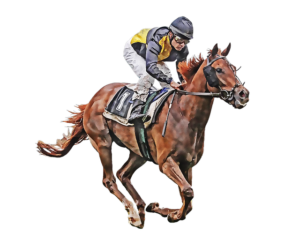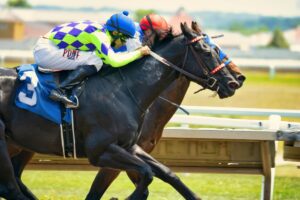The Horse Racing Season Ahead
 It’s now the start of the Flat turf season for the two year olds. It’s a time of excitement but also tinged with trepidation. Perhaps that is a little too strong a word.
It’s now the start of the Flat turf season for the two year olds. It’s a time of excitement but also tinged with trepidation. Perhaps that is a little too strong a word.
I am ready for the journey ahead.
This year seems even more important than most, which is saying something after 30+ years of work. To be a professional gambler takes in-depth knowledge and a grounded person. I didn’t just wake up one morning with the skills to beat the layers. It has been a journey of self-learning, testing my mettle, and appreciating mistakes. It would be foolish to consider the layers are easy prey. Bookmakers don’t make millions a year from being second best. As the saying goes: ‘Vegas wasn’t built on winners.’
When it comes to skill, I am prepared to look the best in the eyes and smile.
However, I don’t want to realize this time next year that I was foolish in my endeavours.
As with all investments, there are no guarantees. We live in a very competitive world. Just because we can’t see the competition, it doesn’t mean it’s not there. As Dave Nevison once said: ‘Bet like a man.’
We all have dreams. At least, we should do. But, let’s face it, few are going to help them come true. We are either building our dream or someone else’s. That’s why I have worked hard to be my best. All I can be, which is everything, is as good as I can be. When gambling it isn’t all about winners. It is about finding value. Betting with skill so that long-term you win. I could bet £1000 over ten bets at 1/10 to win £1000. One loss, I would break even. So often people bet on favourites because they give false hope. They are an illusion. You see the winners but are they ever enough to discount the losers which bite into your profit?
People are surprised when I say: ‘I rarely bet on a horse that isn’t double-figure odds.’ I can see in their face that it puzzles them. They cannot grasp how that can be but also appreciate that when I say something it has worth. Without question, it intrigues them. They always want to know more and appreciate how this works.
Perhaps it sounds like alchemy.
‘So you can turn lead into gold. Is that what you’re telling me?’
They never ask that question, although I’m sure they are thinking it. I say they, as I have a mailing list of about 1000 subscribers. I rarely send out any mailings. The strange thing is that people are interested in less than more. I guess it makes sense. When you try too hard to sell people can see it a mile off. I have nothing to sell. That gets the interest to a new level. However, I am doing the horses for myself. I work with my brother and one other person in the group who we kind of mentor. They are there for the ride.
The Flat turf season starts on the 23rd March and finishes in early November. Out of season, I have been updating my horse trainer statistics. There are at least 200 horse trainers in the UK. It pays to have an appreciation of all. Every trainer has their day. If they train long enough they will get a good horse, eventually. They deserve one.
So I have been honing my skills to be up to the task.
You may be reading this and thinking: ‘What does he know?’
You’d be surprised. Each and every mistake has been assessed to make improvement. Each question answered. But within that understanding a knowledge there will be more questions to come. Additional answers found. It takes time to cut and polish a diamond. You don’t just give it to someone who fancies a go.
To be a good gambler, you need to keep calm. You need to be confident in your knowledge and ability. You need to enjoy what you are doing and make it work for you. Too many people are stuck on this eternal conveyor belt, and they cannot get off. Quite often, they have actually created it themselves.
The answer to the question of gambling is having the skills to make a healthy profit and bet enough money to outweigh the cost of living.
That is where the bar is set.
I don’t worry about the layers. It is very much like an elite athlete. They have to perform to their best. That’s how they get world records.
In truth, the season is short. The start of the season is slow to gather pace. And that’s why every opportunity must be taken. However, you cannot afford to push too hard. Never try too hard. Never look for the next winners as if it can be thought into being. Just put in the time, use your skills and bet accordingly.
Simply do what you should do all season.
Work with professionalism.
When the winners come, enjoy them. Go do something exciting. Re-enforce the act of success.
The money is there to be won.
You don’t even need to be the best in the world.
Just be a little better than most.
Going To The Cheltenham Festival
 I don’t like being negative so I’m in two minds to write this article. I’m a lover of horse racing and frequently visit Great Yarmouth Racecourse. I know what you are saying: ‘Well, I see your problem already! You’ve been following the wrong code of racing from the start. How can the Flat compare with the National Hunt?’ I’ve been to a couple of National hunt meetings: Huntingdon & Fakenham. To be honest, I enjoyed the experience. Sadly, I’ve seen a couple of horses fatally injured. Nothing worse that hearing the sigh of the crowd, followed by the cheering on the winner and five minutes later a jockey walking back with a saddle but no horse. That’s not my reason for not wanting to go to the Cheltenham Festival.
I don’t like being negative so I’m in two minds to write this article. I’m a lover of horse racing and frequently visit Great Yarmouth Racecourse. I know what you are saying: ‘Well, I see your problem already! You’ve been following the wrong code of racing from the start. How can the Flat compare with the National Hunt?’ I’ve been to a couple of National hunt meetings: Huntingdon & Fakenham. To be honest, I enjoyed the experience. Sadly, I’ve seen a couple of horses fatally injured. Nothing worse that hearing the sigh of the crowd, followed by the cheering on the winner and five minutes later a jockey walking back with a saddle but no horse. That’s not my reason for not wanting to go to the Cheltenham Festival.
Living in Cambridgeshire, a Fen Boy, it would take three or four hours to get to Prestbury Park, Gloucestershire. I guess I could get the train from March changing at Birmingham New Street and some 2 hours and 6 minutes later I’m at Cheltenham Spa. Standard return costs £105.10 or First Class at £275.20.
I could have got a day out with the Ship Inn public house in my home town which would have been a much cheaper alternative. Paul, the landlord, is a lovely man and generous. My brother and I have been with the groovy gang to Fakenham (the first time called off when we arrived after torrential rain and waterlogging), the second time I couldn’t attend but my brother, Tony, and cousin, Danny, had a great day out and returned in profit.
Cheltenham tickets range from £37 – £86 (Club Enclosure) so a pretty expensive affair if you want to go all four days.
£7.50 for a pint of Guinness. Yes, it’s probably a quid extra compared to Great Yarmouth. In fact, the entry to Ladies’ Day on the coastal track is a pretty similar price (£31).
I know what you’re saying: ‘It’s horses for courses.’
To be fair you are getting closer to my reason why the impossible is happening before your eyes that I would rather go to Great Yarmouth than The Cheltenham Festival. ‘The sea air must have addled his mind! A candyfloss laden with drugs. Perhaps the Puppet Man had a word in my shell.’
In reality, I can’t give the reason of travel times as an excuse. It takes an hour less to get to Cheltenham.
The problem I have with Cheltenham is that it’s one hell of a busy place. In fact, 65,000 people attend each day. I’m not sure how busy and cramped that seems but watching on TV I kind of think about a goldfish in a bowl. A small round bowl, without the gravel or castle. As the weather turns, I’m thinking where will I go to get out of the rain. Do I need a wax jacket, flat cap and Dunlop Wellington boots? Should I take a packed lunch? And will I ever get to the bar for my pint? And after a few pints, how long do I have to wait for the toilets?
I remember years ago I went on a bus from our local The Lord Nelson pub to Royal Ascot. I think that was Ladies Day. Honestly, that was one of the worst days I ever had at the races. It rained all day. Drenched to the skin. Huddled under cover for a short time like sardines in a can. If I could have clicked my fingers, I’d have been transported home. Instead we had some old coach take us home. An endless journey, starring out of a rainy window. Communities looking at us thinking we had been rescued from a sinking ship.
I’ve never been so happy to return home.
The thought of travelling to the Cheltenham Festival to be stuck in a giant crowd isn’t a good feeling. A sea of umbrella’s (I’d be one of the poor souls who didn’t bring theirs), squelching feet. Honestly, one loser would push me over the edge. I’d be crying into my Guinness which would be topped up with rain.
I’m sure if dressed for any weather, a luxury hotel down the road and some VIP experience I’d be singing to the rafters about my day(s) at Prestbury Park.
Give me a lovely summer’s day at Great Yarmouth, ideally mid-week when there’s hardly a crowd.
Sometimes you have to be against the crowd.
On this occasion I am.
Patrick Veitch: The Winning Line Racing Tips
 I started reading Patrick Veitch’s Enemy Number One: The Secrets Of The UK’s Most Feared Professional Punter, published by the Racing Post in 2009.
I started reading Patrick Veitch’s Enemy Number One: The Secrets Of The UK’s Most Feared Professional Punter, published by the Racing Post in 2009.
It’s a good read. In fact, I’m halfway through it. A mix of professional punting, scared for his life and even selling racing tips. I say racing tips in the way of being paid to give racing tips. This was an interesting read from Mr. Veitch who detailed that while studying Mathematics at Trinity University at Cambridge he was paid to give racing tips, which paid well. He teamed up with a few people along the way and had advertisements in The Sporting Life and Racing Post, at one time under the name of The Professional. By all accounts it was a good money spinner until other tipsters – let’s call them the good, bad and ugly – starting to saturate the market and it wasn’t viable from there on.
After his initial tipster escapades, Veitch was approached by The Winning Line, founded in 1992 by Stephen Winstanley, a costly subscription service, which detailed the tips via recorded telephone messages. For this he sign a contract and was paid £100,000 per annum and bonuses on performance. It was a lucrative deal but something that didn’t sit very well with ‘Baby Faced Assassin’ who would rather have time for himself and do his own thing. He made a healthy profit for the company, which obviously kept the punters happy.
I found it interesting from reading Dave Nevison’s A Bloody Good Winner: Life as a Professional Gambler, published by Highdown in 2007, that he too had been paid £100,000 for his tips by The Winning Line in 2000. On balance, it would seem that both appreciated the earning potential of the contract but for both tipsters it was a short-lived experience.
I think Veitch worked with The Winning Line around 1995 and Nevison in 2000. I wonder if there were any other high-profile professions who were involved. It would be intriguing to know the other faces and how they went. I would love to read a book published about The Winning Line as it would be fascinating to hear the thoughts of both partner’s Stephen Winstanley and Nick Stewart.
If the horse racing tipster of today are making money at the same level it must be a very lucrative deal. As Veitch detailed, The Winning Line was very successful in his duration and within minutes of tips being given the prices shortened. This has been the case with other services and the market adjusts for those who are well informed. In fact, many imply have their tips were passed on by other tipsters as their own which was even accepted by some publications and turned a blind eye to.
It would seem that both Veitch and Nevison made hay while the sun shined but the implications of working in the world of giving racing tips hindered their enjoyment of simply being professional gamblers.
A fascinating read.
Gambling: Don’t Create Bad Habits
 After studying gambling to a very high level I have learned a lot over the years. It’s a long road. There is no easy answer to anything worthwhile and expertise is about finding answers to questions, just ask any of the best Horse tipsters. In ways, every answer is important but until you learn enough there is no way of knowing the importance of yes, no or maybe. In those early years, there are far too many maybes. And that is the same for creating bad habits.
After studying gambling to a very high level I have learned a lot over the years. It’s a long road. There is no easy answer to anything worthwhile and expertise is about finding answers to questions, just ask any of the best Horse tipsters. In ways, every answer is important but until you learn enough there is no way of knowing the importance of yes, no or maybe. In those early years, there are far too many maybes. And that is the same for creating bad habits.
To be a good gambler on a skill-based sport you need a vast knowledge. This will only come from a passion for your subject matter, an inquisitive nature, wanting to learn, and digging to learn more. It isn’t something which can be rushed.
That’s the difficulty of learning a subject where there is no book, no guide, no degree or doctorate.
No nothing.
Each scrap of knowledge is hard earned. Often with the loss of a bet and your hard-earned cash.
Very few people want to give their knowledge away because they get little to nothing in return. In fact, it is most likely detrimental to them.
So the knowledge you have gained never come easy. Far from it. You will have to go the extra mile, perhaps a million miles. You may never get there. But you won’t know that until it is too late.
There are many crucial things you need to learn. The process and method you employ is as important – if not more – than the selection itself. For example, if you bet on the same horse but fail to follow the best approach it may result you winning little to nothing. Get it correct, and you will make a killing.
So where does the bad habit come to haunt you?
When you do not stick to your guidelines, rules, method and process it’s a problem.
These statements may seem very open-ended and vague but they won’t when you get to the level of competence. Don’t push too hard, go above and beyond your best process and method because that is classed as a bad habit.
But what is the consequence of a bad habit?
Let’s consider this definition: Bad habits typically provide temporary pleasure or relief but often have negative consequences in the long term.
A bad habit may be your foolish attempt to make easy money. The worse thing may be if this works but is in actual fact a bad decision. In fact, long term this is an action which will cost you money. Instead of moving forward, you have slipped back a notch or lost track completely. A seemingly innocent act could be the creation of a bad habit.
The only way this will be resolved is by correction.
The best answer to that question is to make sure you don’t create bad habits. This is easier said than done but it is something you will understand more easily with time and experience, ultimately knowledge.
Being a good gambler is a journey of discovery finding answers to questions but also avoiding bad habits.
Good luck.